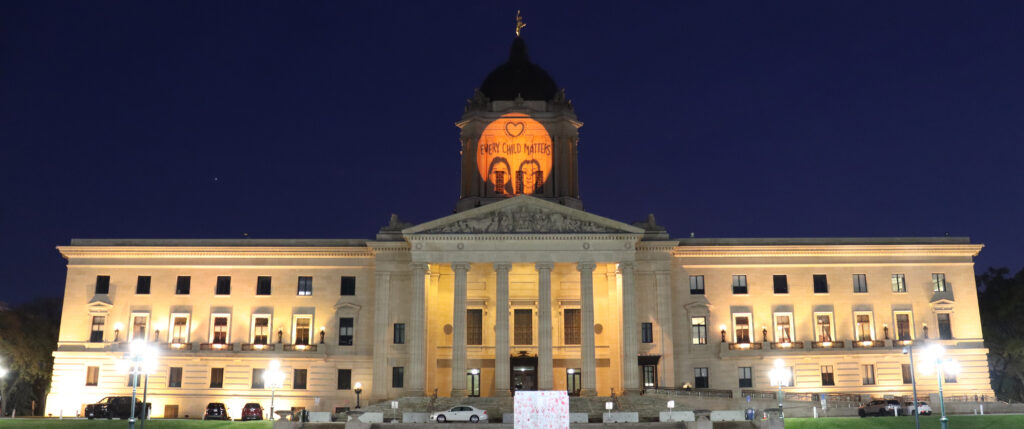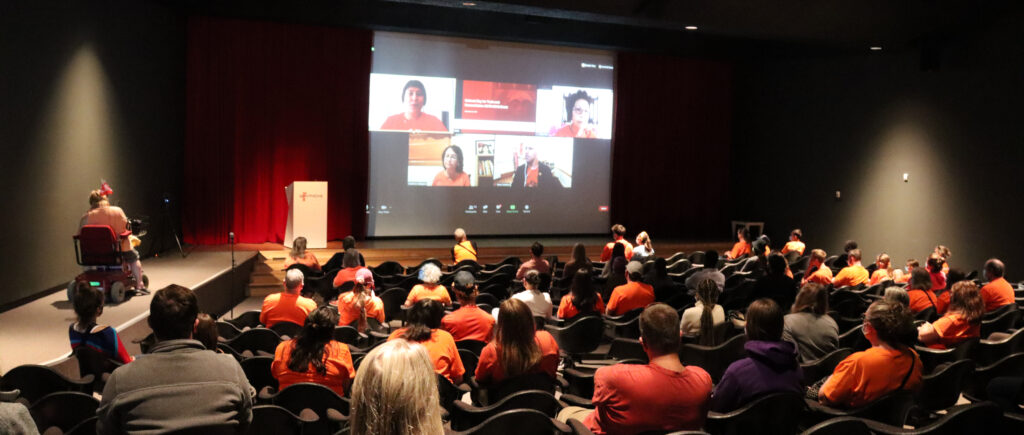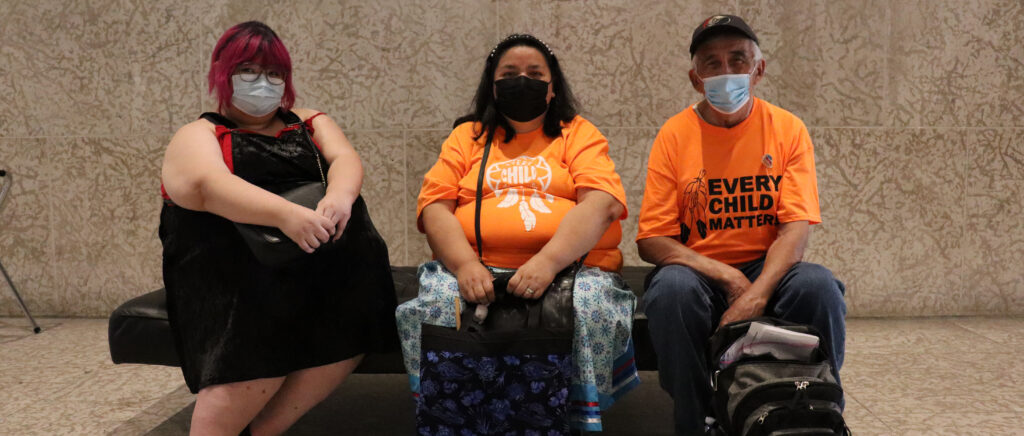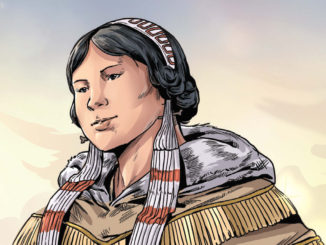Survivors, families, city councillor among those at event seeking knowledge and truth
Carmen Ponto
Kicker

WINNIPEG – School survivors, a city councillor and rural families were among those who attended Qaumajuq’s Day for Truth and Reconciliation event, which drew more than 200 people.
Thursday was the first annual National Day for Truth and Reconciliation, set to take place every Sept. 30. Coming about as the result of grassroots efforts by survivors, the day was meant to honour those who attended residential school and to raise awareness of the ongoing impacts of the schools upon Indigenous communities.
The event venue, Winnipeg Art Gallery’s Qaumajuq (Inuit for ‘it is bright, it is lit’), is a newly constructed building at the gallery that showcases Inuit art. The centre welcomed 220 participants on Thursday. The masked crowd gathered in the auditorium to watch interviews, a panel discussion and a residential school survivor’s story – all projected onto a large screen at the front of the room.
Betty Ross, a residential school survivor, told the story of her time at residential schools. Panel members and other speakers included residential school survivor Marlene Gallagher, author Monique Gray Smith and CBC host Shelagh Rogers.
Reconciliation
Several themes emerged from the discussions. Among them was the importance of truth and reconciliation.
“Reconciliation is very sacred, and very powerful,” Ross said.
Ross went on to say that as a larger society, we are just now collectively trying to define what the word means, and the struggle is far from over.
For Jennifer Watt, 26, the mere fact that there is a day for reconciliation is an opportunity.
“It’s like we’re given the chance to actually grieve what we went through,” Watt said.
Jennifer attended the event with her mother Norma Watt, a day school survivor, and her grandfather Louis Watt, a residential school survivor. The family is Cree, originally from God’s Lake First Nation.

Truth
While telling her story, Ross held up an eagle feather – an important symbol that she said represents truth.
“Truth is so powerful, so sacred,” Ross said.
Louis Watt, a survivor from Cross Lake residential school – the same one Ross attended – said that what Ross described about her experience at Cross Lake is only part of the story.
Ross described many horrific details, recounting an instance where nuns threw dog biscuits at the children to eat at snack time. She said she still has the scar where a biscuit hit her forehead.
Louis, speaking quietly, said that he is not ready to talk about the difficulties he suffered at Cross Lake, or at the second residential school he attended – Assiniboia, in Winnipeg. He said, however, that he wants people to know that there were good parts, too. He described playing on the Assiniboia hockey team and proudly pulled out from his backpack a carefully kept news article containing a photograph of himself and his team. The article described the team as the one to beat from 1960-1964, winning five consecutive provincial titles.
“They always say there’s two sides to a story; there’s some good and some bad,” Louis said. “This one is bad and good.”
Scott Gillingham, a city councillor for Winnipeg’s St. James area, welcomed the opportunity to listen to the speakers and stressed the importance of stories such as Ross’s being taught at schools so that younger generations have a better chance at a “stronger society, a stronger Canada”.
“For our children to be learning that now, it’s really critical,” said Gillingham. “Because in their formative years, they’re learning the truth that we never learned decades ago.”
Scott’s wife Marla Gillingham, who works as support staff at an elementary school in Winnipeg’s St. James, said that although schools are finally stepping up, it is up to adults who never learned about these stories as children to educate themselves now.
“Intergenerational trauma is a real thing, and it thrives.”
Jennifer Watt, granddaughter/daughter of residential and day school survivors
Another family taking in the event spoke through tears about the importance of learning about Canada’s painful history. The Siemens family, who live in Winkler, a small town in Manitoba, are multicultural themselves. Corinna and Henry are French Canadian and Mexican, respectively, while their adopted son, Dylan, 10, is German, and their adopted daughter Natalia, 13, is of Inuit, Cree, and Anishinaabe descent.
The Siemens family has dedicated extensive time and attention to learning about Natalia’s culture. Henry said that through their learning, the shock that Canada’s atrocities “are as bad as anywhere and in some ways maybe worse than many” has been difficult for them.
“We literally tried to erase an entire group of people,” Henry said.
Racism thrives
The speakers emphasized several times during the panel discussion that the racism and trauma brought about by colonization and residential schools is far from over.
“We have residential schools, but after that, we have the ’60s Scoop,” Marlene Gallagher, one of the panel members, said to nodding audience members. “And today we still have the child welfare system.”
Gallagher said that having a day to honour survivors is just the beginning.
Jennifer Watt agreed: “Intergenerational trauma is a real thing, and it thrives. The racism still thrives.”
Jennifer described an incident when she was in elementary school in the early 2000s. She said a teacher told her entire class that her people were savages – treating this statement like a lesson that all the students had to learn.
“There’s so much more to it than residential schools,” Jennifer added. “I’ve seen so many preventable deaths happen in my family, more than I’ve seen natural caused deaths. I have cousins that committed suicide or were murder victims. No one should ever have a relative taken away from them in a way that isn’t natural. But for Indigenous people that’s so normal for us.”
Words not enough
For Norma and her father, none of the apologies offered thus far from the Church have been enough.
“All the apologies in the world aren’t going to do anything for me.” Norma said.
Louis nodded, adding his own words, directed at the country’s politicians and the Catholic Church: “Where were you when we needed you?”

Hope
The Watt family has a complicated relationship with the Catholic church. Despite the family’s experiences with day schools and residential schools, Norma Watt holds onto her Catholic faith.
“The three strengths I have are the man upstairs, my children, and this,” Norma said, pointing to the drum that she brought along. “If you were to ask me how does that come together for me, I wouldn’t be able to answer that question.”
Despite the grim topic of Thursday’s event, the speakers and attendees alike shared messages of hope. To a silent, rapt audience, Betty Ross expressed her gratitude for the opportunity to share her story with those so eager to listen.
“There’s no term in the English language to describe how I feel today,” Ross said. “Know that each and every one of you sitting here are a big part of my journey.”
Jennifer Watt echoed similar sentiments.
“Our people are very loving and caring. We hold onto our hope no matter what.”
As Jennifer and her mother clasped hands while sharing their stories, she added, “The medicine of love is so powerful and strong. We’re still here! Never let go of love, because it’s more powerful than people will ever know.”
Correction: On Oct. 5, Kicker mistakenly quoted Louis Watt asking politicians and the Catholic Church, “Where were we when we needed you?” He actually asked, “Where were you when we needed you?”




Be the first to comment